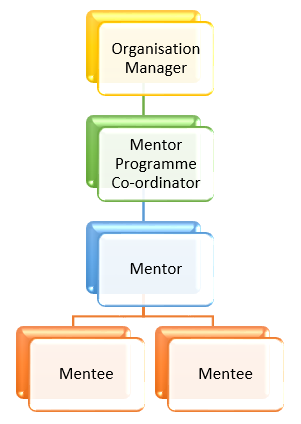M3.06. Preparing the evaluation of the mentoring process
1. What is Evaluation
The purpose of evaluation is to facilitate an assessment of a mentoring programme and, through analysis of the collected data, conclusions are developed about the quality, value, significance and merit of the programme. These results can be disseminated to those who have a vested interest in the programme (stakeholders) and can be used to make improvements to the quality of the programme.
Evaluation is a key step in the mentoring programme; the outcomes of the evaluation could determine the fate of the programme. It is, therefore, essential that evaluation is done correctly, and the following pitfalls are avoided:
- Unfair assessments by the evaluator
- Incorrect evaluation methods used
- Misunderstanding of the data collected
- Misrepresentation of the data collected
- Corners are cut during the evaluation process due to lack of experience/resources
Evaluation is a valuable process because it provides an opportunity to use the evaluation results to make positive changes to a current mentoring programme or it may provide the incentive to roll out a piloted programme to more departments.
Mentoring programmes implemented within an organisation can vary in their size and structure. This variation can be caused by several factors, for example;
- Organisation size
- Number of departments within the organisation
- Perceived need for a mentoring programme
- Resource availability
- Length of time mentoring programme has been in place (i.e. may be piloted in one or two departments, before being rolled out within the whole organisation)
The following organograms show the potential variations between two different mentoring programme structures.

Organogram showing mentoring programme across three departments

Organogram showing a small mentoring programme
The evaluation process, using evaluative thinking, is a systematic approach which;
- Identifying assumptions about why you think your strategy, initiative or programme will work.
- Determining what change you expect to see during and after you implement what you set out to do.
- Collecting and analysing data to understand what happened.
- Communicating, interpreting and reflecting on the results.
- Making informed decisions to make improvements.
The evaluation is a collaborative approach, which involves several stakeholders, including;
- Parties involved in the funding of the programme
- Organisational staff
- Mentoring programme participants
- Board members
- Participating organisations (e.g. contracted external evaluators)
- Policymakers
The evaluation process should have a strong focus on utility; i.e. the outcomes of the evaluation should be practical and useful for end-users/stakeholders. Therefore, the evaluation should consider;
- Implementation and impact as an ongoing process and what your actions should build on, rather than replace
- Existing information systems to promote improvements that you can sustain over time
- Previous lessons learned from research along with the current expectations of the stakeholders
- Expected results, and how reality may differ from theory
- The value of the results which will be obtained through the evaluation process
The mentoring programme implemented within your organisation will influence the strategy for monitoring and evaluation. A small programme with only a few active users (e.g. mentor, mentee, mentoring manager) will need a different approach for evaluation than, for example, an organisation-wide mentoring programme with many participants, and many levels. Additionally, a mentoring programme may be formal or informal, irrespective of the number of people involved.
A formal mentoring programme is more likely to have policies and procedures in place, which will be valuable in planning for monitoring and evaluation. In this section, the methods and techniques for evaluating a mentoring programme will be discussed. This will allow you to make an informed decision when developing your own evaluation plan.
